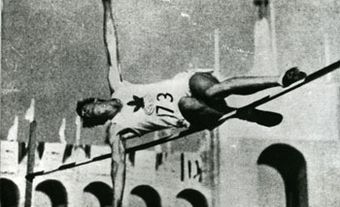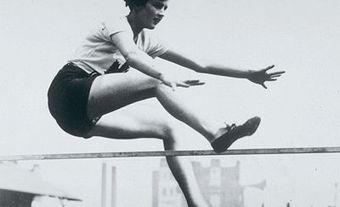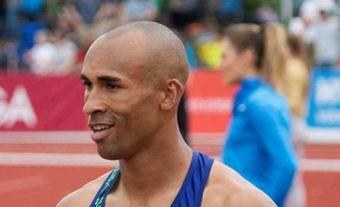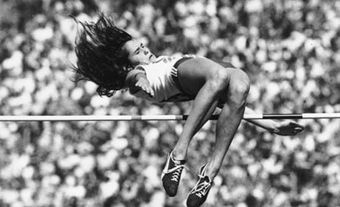Derek Drouin, high jumper, track and field athlete (born 6 March 1990 in Sarnia, ON). Derek Drouin was the first men’s high jumper in NCAA history to win five national championships. He went on to win a silver medal at the 2012 Olympic Summer Games in London and a gold medal at the 2016 Olympic Summer Games in Rio de Janeiro. He was the first Canadian to win Olympic gold in a field event since Duncan McNaughton in 1932. Drouin also won gold medals at the 2014 Commonwealth Games, the 2015 Pan American Games and the 2015 IAAF World Championships. He is one of only 10 male high jumpers to clear a height of 2.4 m outdoors — the Canadian record. Drouin introduced innovative new techniques to the sport and has been called “the best high jumper of the modern era.”
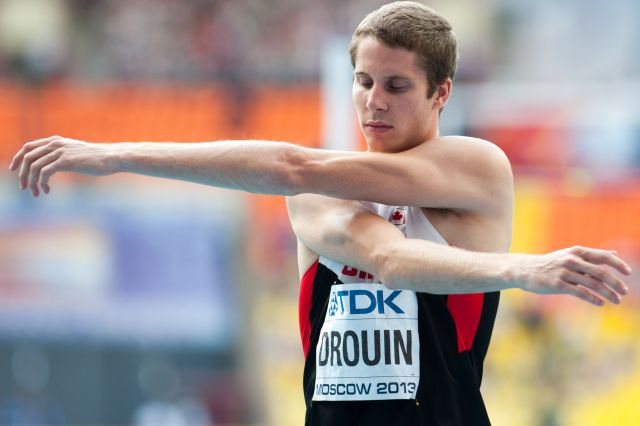
Childhood and Family
Derek Drouin is the youngest of three children of Sheila and Gaetan Drouin. Derek’s older sisters are Jillian and Alysha. Jillian was an elite heptathlete and earned a track and field scholarship from the University of Syracuse.
Growing up in Sarnia, Ontario, and nearby Corunna, Derek Drouin had a reputation for being “reckless,” according to Sportsnet's Kristina Rutherford. He broke both of his arms twice before the age of six. In kindergarten, Drouin was introduced to high jump by his teacher, Kelly Gihuly, at St. Joseph Catholic School in Corunna. He instantly expressed interest. When he was around seven, he would place a broomstick over two speakers in his basement, then run down the hallway, jump over the broomstick and land on the couch.
High School Athletics
Drouin started running in track and field at age nine and took up the high jump at 15. While attending St. Patrick’s Catholic High School in Sarnia, Drouin had great success in athletics. He was the school’s track MVP and field MVP each year from 2005 to 2008. In 2006 and 2008, he won the gold medal in high jump at the Ontario Federation of School Athletic Associations Championship. He also set the Lambton Secondary School Athletic Association record in the men’s 110 m hurdles with a time of 14.6 seconds.
While still in high school, Drouin represented Canada at the 2007 World Youth Championships in the Czech Republic. In the fall of 2008, he won the bronze medal for Canada at the 2008 Commonwealth Youth Games in Pune, India.
NCAA Dominance
After high school, Drouin was recruited as a multi-event athlete by Indiana University, which he attended from 2008 to 2013. While competing for the Hoosiers, Drouin had historic success at the National Collegiate Athletic Association (NCAA) level. He became the first high jumper in NCAA history to win five national championships. He won the gold medal in the men’s high jump at the Division I Outdoor Championships in 2010 and 2013, and the gold medal in the men’s high jump at the Division I Indoor Championships in 2011 and 2013.
At the 2013 Indoor Championships in Fayetteville, Arkansas, Drouin won the gold medal with a jump of 2.35 m. He broke Mark Boswell’s Canadian indoor record of 2.33 m, set in 2000. In 2013, Drouin was named Indiana University’s Male Athlete of the Year and the 2013 United States Track & Field and Cross Country Coaches Association Men’s Division I National Field Athlete of the Year. He was also ranked among the top 20 men’s hurdlers in NCAA, with a personal best time of 13.87 in the men’s 110 m hurdles. He graduated with a degree in kinesiology in 2013.
Olympic and International Success
While attending Indiana University, Drouin represented Canada at several international events, with great success. However, a year prior to his first Olympic season in 2012, he tore three ligaments in his foot and had a chipped bone that required surgery. Despite this, he won two medals for Canada leading up to the 2012 Olympic Summer Games in London. He won the gold medal at the Crystal Palace Aviva Grand Prix in London with a jump of 2.26 m, and the bronze medal at the Monaco Herculis with a jump of 2.30 m.
At the 2012 Olympics, Drouin originally won the bronze medal with a jump of 2.29 m. However, the medal was upgraded to silver in 2021 after it was determined that the initial gold medallist, Ivan Ukhov of Russia, had participated in a steroid doping program.
A week before winning his fifth NCAA Division I title in the high jump, Drouin won the bronze medal at the Prefontaine Classic in Eugene, Oregon. He jumped a Canadian outdoor record 2.36 m, which broke Boswell’s outdoor record of 2.35 m.
World Championships Success
Drouin followed his Olympic medal in London with his first world championships medal in Moscow on 15 August 2013. He had a jump of 2.38 m, which broke his own Canadian record and was good enough to win bronze. A month later, on 14 September 2013, Drouin won the gold medal at the Francophone Games in Nice with a high jump of 2.30 m.
In 2014, Drouin had a sizzling start to the season. On 25 April, he became only the 10th male high jumper ever to clear 2.4 m outdoors when he posted his career-best result in winning the Drake Relays in Des Moines, Iowa. Then on 9 May 2014, he won the Doha Diamond League event in Qatar with a high jump of 2.37 m. On 30 July, Drouin won the gold medal at the 2014 Commonwealth Games in Glasgow with a jump of 2.31 m.
In 2015, Drouin generated momentum heading into the IAAF World Championships by winning the gold medal at the 2015 Pan American Games in Toronto with a jump of 2.37 m. At the 2015 World Championships in Beijing, Drouin had a gold medal-winning jump of 2.34 m, beating Guowei Zhang of China and Bohdan Bondarenko of Ukraine by one one-hundredth of a metre.
Olympic Gold
At the 2016 Olympic Summer Games in Rio de Janeiro, Drouin became the first Canadian to win an Olympic gold medal in a field event since Duncan McNaughton won gold in the men’s high jump at the 1932 Olympic Summer Games in Los Angeles. Drouin was perfect in Rio: he won the gold medal with a jump of 2.38 m and became only the sixth high jumper ever to win Olympic gold without a missed attempt.
Decathlon and Injury Struggles
Following the 2016 Olympics, the 26-year-old Drouin announced his intention to return to his multi-event roots and compete in the decathlon. “I was always a pretty strong hurdler in college,” Drouin told The Canadian Press in February 2017. “I really love throwing javelin. I was always competitive in multis in college and I loved it.”
However, a series of injuries has since derailed Drouin’s career. He suffered three significant injuries to his Achilles tendon and a badly herniated disc in his neck. As a result, he missed the 2017 World Championships, the entire 2018 and 2019 seasons, and the 2020 Olympic Summer Games in Tokyo in 2021. His most notable result in this period was a bronze medal in high jump at the 2017 Oslo Bislett Games.
Innovations and Legacy
Derek Drouin and his college coach, Jeff Huntoon (who was also hired by Athletics Canada), introduced several important innovations to high jumping, particularly in how to approach the bar. Instead of running fast and accelerating towards the bar to propel himself over it, as most high jumpers do, the six-foot-five Drouin moves at a slower, more deliberate pace, taking large, bounding strides. This allows him to plant his jumping leg more firmly and transfer energy more effectively. He also fully extends both arms behind him and thrusts them forward as he leaps, extending his straightened lead arm over the bar; this keeps his back relatively flat rather than arched, which in turn makes it easier for his legs to clear the bar. (The New York Times published an in-depth breakdown of the technique in 2016; see External Links below).
In 2021, Stadium Talk ranked Drouin No. 7 on their list of the greatest high jumpers of all time and called him “the best high jumper of the modern era.”
See also Track and Field; Canadian Gold Medal Winners at Olympic Summer Games.

 Share on Facebook
Share on Facebook Share on X
Share on X Share by Email
Share by Email Share on Google Classroom
Share on Google Classroom

